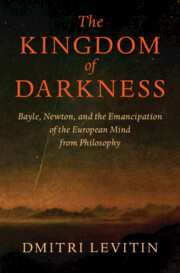Book contents
- The Kingdom of Darkness
- The Kingdom of Darkness
- Copyright page
- Contents
- Preface
- Abbreviations and Conventions
- General Prologue
- Part I Giving Up Philosophy
- I Prolegomena
- I.1 Emancipating Natural Philosophy from Metaphysics
- I.2 Emancipating Theology from Philosophy
- I.3 Reconstructing the Pagan Mind in Seventeenth-Century Europe
- Part II Pierre Bayle and the Emancipation of Religion from Philosophy
- Part III Isaac Newton and the Emancipation of Natural Philosophy from Metaphysics
- Part IV The European System of Knowledge, c.1700 and Beyond
- Bibliography
- Index
I.2 - Emancipating Theology from Philosophy
from Part I - Giving Up Philosophy
Published online by Cambridge University Press: 23 March 2022
- The Kingdom of Darkness
- The Kingdom of Darkness
- Copyright page
- Contents
- Preface
- Abbreviations and Conventions
- General Prologue
- Part I Giving Up Philosophy
- I Prolegomena
- I.1 Emancipating Natural Philosophy from Metaphysics
- I.2 Emancipating Theology from Philosophy
- I.3 Reconstructing the Pagan Mind in Seventeenth-Century Europe
- Part II Pierre Bayle and the Emancipation of Religion from Philosophy
- Part III Isaac Newton and the Emancipation of Natural Philosophy from Metaphysics
- Part IV The European System of Knowledge, c.1700 and Beyond
- Bibliography
- Index
Summary
No less important a structural development than the emancipation of natural philosophy from metaphysics was the self-conscious emancipation of theology from philosophy, largely achieved by making philology and historical scholarship – rather than philosophy – the primary handmaidens to the discipline. This did not happen at the hands of a small band of liberal outsiders (‘Erasmians’, ‘latitudinarians’, etc.), but within the theological mainstream. In the Catholic world, all major locales (starting with the Spanish Netherlands, and culminating in France) witnessed a self-conscious shift from ‘scholastic’ to ‘positive’ theological method. By the second half of the seventeenth century, a similar development had occurred in all the major areas of the Reformed world. Crucially, this shift should not be taken for a form of ‘fideism’, even if its conceptual resources sometimes seem to imply it. At the basic epistemological level, conceptions of theological truth remained broadly the same as they had been since c.1300: divine mysteries could be above reason, but could not contradict it; the truths of natural theology could be proved rationally. But within this broadly continuous framework a huge methodological shift took place, one that significantly curtailed the cultural authority of apriorist philosophy. Calls for the separation of philosophy and theology usually worked to the detriment of the former.
- Type
- Chapter
- Information
- The Kingdom of DarknessBayle, Newton, and the Emancipation of the European Mind from Philosophy, pp. 120 - 164Publisher: Cambridge University PressPrint publication year: 2022



